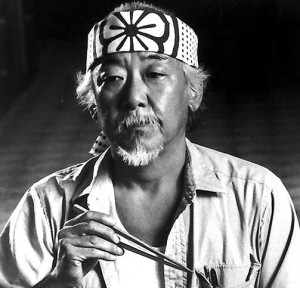People like to get advice when they’re working on something they’re not too sure about that could easily blow up in their face. When my lovely wife is trying out a new-to-us, Classic Family Recipe, she calls her mom (which I’m pretty sure her mom loves).
Now, if she times it right (or, to be honest, wrong), she’s going to get a lot more advice than just her mom’s. I remember one call in which she asked about cooking a proper New York strip steak and ended up with her uncle on the line, giving her a ten minute coaching session on how to cut the thing once it was cooked. One of her sisters will remind her not to leave the gas stove burning all night (a: we have an electric, b: we’re not actually stumbling morons), another sister will suggest she just go out to eat. It’s charming, and familial, but it’s not necessarily all useful, you know?
But how to do we know what the crap advice is? Kate’s mom happens to be a good cook – we know this because we’ve eaten her food – but if she were just “ktsmom113@yahoo.com”, posting her suggestions in a forum, how much credence should we give her?
Not… you know… a lot. Unless the advice itself is good.
“But… Doyce?” I pretend you are asking, “How do we know if the advice is good? If we knew enough about the subject to tell the good from the bad, we wouldn’t need the advice.”
That’s a fair point, pretend-you-in-my-head; well said. It’s a tricky situation, and it’s not as though you can just look at what the person has done or not done in their life to determine if they’re a qualified expert.
Kate’s mom has a degree in chemistry, not culinary arts. I have a friend, De (hi, De!), who gives me wonderful (and harsh, and uncompromising, and brutally honest) writing advice (which I take! I really do! It just takes me a few days to agree…); but she hasn’t published a book any more than I have (to which I’ll add “yet” to placate both our egos) – where does she get off giving me advice on writing, and what turnip truck did I fall off that I’d listen to her? (The answer is: because she knows writing, and her advice makes my story better. Duh.) I have another friend who happens to be a very successful author, but I’d never take her advice on finding an agent (for example), because it would probably amount to “while in college, meet someone who will eventually become an agent, stay friends with them while you both learn your respective trades, then have them represent you”, because that’s what she did.

It’s confusing, so how do you check?
- Are they at least involved in the field in some way?
If it’s writing advice, are they a writer? Or an agent? Or an editor? Are they, perhaps, married to one of those types of people (you rarely find an expert’s spouse trying to give advice on their spouse’s field of expertise, but that doesn’t mean they can’t – it just means they have some sense). - Do they study the subject?
I don’t self-publish (epublish or make any of my work available via POD services/Amazon). I have nothing against it, but right now I’m working through Hidden Things with a tradition writer -> agent -> publisher approach, and that’s where my energy is going. However, while I’m not actually in the trenches of self-publishing at the moment, I am studying the HELL out of it, and I can quote you cost breakdowns and comparisons and marketing tips and distribution methods until you run screaming from the room. There are people out there who could give you better advice, by virtue of being in those trenches, but my advice would not, probably, be bad. - Do they listen to/make use of the experts?
There’s a web site out there that specializes in telling writers how to find an agent (okay, there are hundreds, but I’m thinking of one in particular). The punchline is that the person running the site is an author who has not, herself, gotten an agent. WHY would anyone listen to someone like that? Well, because get gets agents to guest star on her site every couple weeks or so, to give honest, from-the-gut response to the first 250 words of people’s stories. Funny tip: you don’t actually have to be good at the thing you give perfectly sound advice on. I mean, that teacher from Fame made Coco the best dancer he could be even though she couldn’t dance anymore. *tears up*
“Double-triple-quadruple check” is what it boils down to, I suppose. Ninety percent of everything is crap, including advice, so it stands to reason you need to check ten sources to even have a decent chance to getting to the good stuff. A hundred sources would be much better.
And don’t freak out too much if the advice is coming from a weird source.
Actually, that’s a fun question: what weird source do you get good advice from? (Like Casa Testerman’s cooking tips from a chemist.)
Even better: how do you identify your experts?

